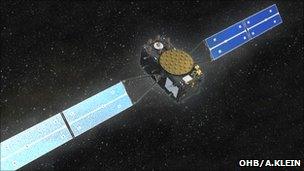SpaceOpal named as Galileo European sat-nav operator
- Published

EU officials predict the Galileo satellite-navigation system will be a massive economic boon
The contract to operate the satellites that will form Europe's version of GPS has been awarded to SpaceOpal.
The 194m euro (拢170m) contract is the fourth of six "work packages" to be announced as efforts continue to roll out the Galileo sat-nav system.
The multi-billion euro programme is over budget and much delayed, but the first spacecraft to prove the system should finally launch next year.
A further 14 operational satellites are expected to fly from late 2012.
SpaceOpal is a joint undertaking between the German firm Gesellschaft f眉r Raumfahrtanwendungen (GfR) and the Italian company Telespazio. GfR was set up by the German space agency (DLR) to offer Galileo services.
SpaceOpal signed the contract with the European Space Agency, which is acting as technical and procurement agent on the sat-nav project for the European Commission.
The company's involvement will involve the day-to-day running of Galileo. It will do this from two Galileo Control Centres in Oberpfaffenhofen, near Munich, and Fucino, near Rome.
"The contract demonstrates the strong commitment and the clear political will to create an independent global satellite-navigation system in Europe," said DLR chairman, Professor Jan Woerner.
Contracts to provide the operational satellites themselves, the rockets to launch them, and additional technical and management support were signed in January.
The two work packages still outstanding cover activities that will monitor the status of the satellite constellation and look after the timing and navigation data which lie at the heart of Galileo.
Galileo should have been operational by now but the project has run into myriad technical, commercial and political obstacles, including early objections from the US, who thought a rival system to GPS might be used to attack its armed forces.
The venture came very close to being abandoned in 2007 when the public-private partnership put in place to build and run the project collapsed.
To keep Galileo alive, EU member-states had to agree to fund the entire project from the public purse. What should have cost European taxpayers no more than 1.8bn euros will now probably cost them in excess of 5bn euros.
The EU's continued commitment to the project despite severe budgetary and management failings is based on the belief that huge returns to the European economy will accrue from the investment.
Already, GPS is said to have spawned global markets that are worth several tens of billions of euros annually.
The new European constellation is expected to deepen and extend those markets as sat-nav functionality becomes ubiquitous in consumer devices such as mobile phones.
"Independent studies have quantified what the advantages are to Europe - about 90bn euros over the next two decades," said Antonio Tajani, the European Commission vice-president with responsibility for transport.
How does sat-nav work? Professor Cathryn Mitchell from the University of Bath explains
- Published18 August 2010